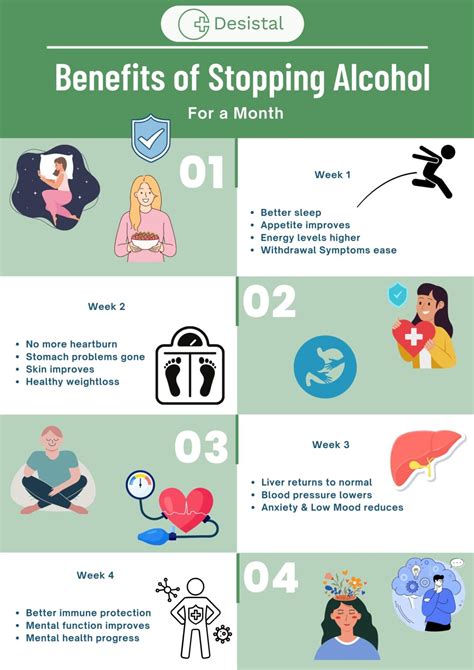Intro
Discover 5 effective ways to stop alcohol consumption, overcoming addiction with strategies for sobriety, recovery, and wellness, promoting a healthier lifestyle.
Alcohol consumption is a widespread habit that can have severe consequences on an individual's health, relationships, and overall well-being. While moderate drinking may be acceptable in some social settings, excessive alcohol consumption can lead to addiction, liver disease, and even mental health issues. For those struggling with alcohol dependence, quitting can be a daunting task. However, with the right strategies and support, it is possible to overcome the addiction and lead a healthier lifestyle. In this article, we will explore the importance of stopping alcohol consumption and provide valuable insights on how to achieve this goal.
The journey to sobriety begins with understanding the risks associated with excessive drinking. Alcohol is a toxic substance that can damage the liver, heart, and brain, leading to chronic diseases and even death. Furthermore, alcohol dependence can strain relationships, affect work performance, and increase the risk of accidents and injuries. By acknowledging the dangers of excessive drinking, individuals can take the first step towards a healthier and more fulfilling life.
Quitting alcohol is not just about willpower; it requires a comprehensive approach that addresses physical, emotional, and psychological aspects. With the right mindset, support, and strategies, individuals can overcome the challenges of stopping alcohol consumption and achieve long-term sobriety. In the following sections, we will delve into the benefits of stopping alcohol consumption, explore the working mechanisms of various strategies, and provide practical tips on how to stay sober.
Understanding the Benefits of Stopping Alcohol Consumption

Stopping alcohol consumption can have numerous benefits on an individual's physical and mental health. Some of the advantages of quitting drinking include improved liver function, enhanced cognitive abilities, and reduced risk of chronic diseases. Additionally, sobriety can lead to improved relationships, increased productivity, and a greater sense of overall well-being. By understanding the benefits of stopping alcohol consumption, individuals can stay motivated and focused on their journey to sobriety.
Physical Health Benefits
The physical health benefits of stopping alcohol consumption are numerous and well-documented. Some of the advantages of quitting drinking include: * Improved liver function: Alcohol is a toxic substance that can damage the liver, leading to liver disease and other health problems. By stopping alcohol consumption, individuals can reduce their risk of liver disease and improve their overall liver function. * Enhanced cardiovascular health: Excessive drinking can increase the risk of heart disease, high blood pressure, and stroke. By quitting alcohol, individuals can reduce their risk of cardiovascular disease and improve their overall heart health. * Improved immune function: Alcohol can weaken the immune system, making individuals more susceptible to illnesses and infections. By stopping alcohol consumption, individuals can improve their immune function and reduce their risk of illnesses.Strategies for Stopping Alcohol Consumption

Stopping alcohol consumption requires a comprehensive approach that addresses physical, emotional, and psychological aspects. Some of the strategies for stopping alcohol consumption include:
- Seeking professional help: Individuals struggling with alcohol dependence can benefit from seeking professional help from a therapist, counselor, or support group.
- Building a support network: Having a strong support network of friends, family, and peers can help individuals stay motivated and focused on their journey to sobriety.
- Engaging in healthy activities: Engaging in healthy activities such as exercise, meditation, and hobbies can help individuals manage stress and reduce their cravings for alcohol.
Working Mechanisms of Various Strategies
Different strategies for stopping alcohol consumption work in various ways. Some of the working mechanisms of these strategies include: * Cognitive-behavioral therapy: This type of therapy helps individuals identify and change negative thought patterns and behaviors associated with alcohol consumption. * Medications: Certain medications such as naltrexone and acamprosate can help individuals manage cravings and reduce their risk of relapse. * Support groups: Support groups such as Alcoholics Anonymous provide a safe and supportive environment for individuals to share their experiences and stay motivated on their journey to sobriety.Practical Tips for Staying Sober

Staying sober requires a long-term commitment to a healthy lifestyle. Some practical tips for staying sober include:
- Setting realistic goals: Setting realistic goals and milestones can help individuals stay motivated and focused on their journey to sobriety.
- Managing stress: Managing stress through healthy activities such as exercise, meditation, and hobbies can help individuals reduce their cravings for alcohol.
- Avoiding triggers: Avoiding triggers such as certain people, places, and situations can help individuals reduce their risk of relapse.
Overcoming Challenges and Setbacks
Overcoming challenges and setbacks is an essential part of the recovery process. Some tips for overcoming challenges and setbacks include: * Seeking support: Seeking support from friends, family, and peers can help individuals stay motivated and focused on their journey to sobriety. * Practicing self-care: Practicing self-care through healthy activities such as exercise, meditation, and hobbies can help individuals manage stress and reduce their cravings for alcohol. * Learning from mistakes: Learning from mistakes and setbacks can help individuals identify areas for improvement and develop strategies for avoiding similar challenges in the future.Conclusion and Final Thoughts

In conclusion, stopping alcohol consumption is a journey that requires patience, persistence, and support. By understanding the benefits of stopping alcohol consumption, exploring the working mechanisms of various strategies, and practicing practical tips for staying sober, individuals can overcome the challenges of alcohol dependence and achieve long-term sobriety. Remember, recovery is a journey, and it's essential to be kind to yourself and seek help when needed.
We encourage you to share your thoughts and experiences on stopping alcohol consumption in the comments section below. Your story can inspire and motivate others to take the first step towards a healthier and more fulfilling life.
What are the benefits of stopping alcohol consumption?
+The benefits of stopping alcohol consumption include improved liver function, enhanced cognitive abilities, and reduced risk of chronic diseases. Additionally, sobriety can lead to improved relationships, increased productivity, and a greater sense of overall well-being.
How can I stay motivated on my journey to sobriety?
+Staying motivated on your journey to sobriety requires a comprehensive approach that addresses physical, emotional, and psychological aspects. Some strategies for staying motivated include setting realistic goals, managing stress, and building a support network of friends, family, and peers.
What are some practical tips for overcoming challenges and setbacks?
+Some practical tips for overcoming challenges and setbacks include seeking support from friends, family, and peers, practicing self-care through healthy activities, and learning from mistakes and setbacks. Remember, recovery is a journey, and it's essential to be kind to yourself and seek help when needed.
